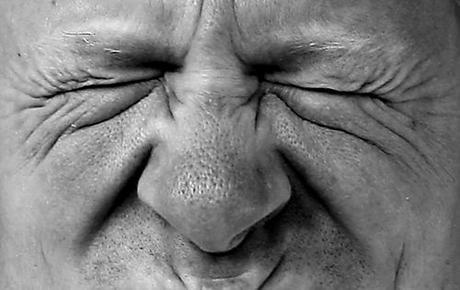There are lots of things to notice when looking at houses. Some you try to overlook to see a home’s potential—strange paint choices, or dated light fixtures—while others should be taken under serious consideration, including structural damage and signs of water intrusion. Something else that should be on a homebuyer’s radar but which doesn’t always register: How the house smells.

Sharlene and I both have pretty sensitive sniffers. This can be somewhat of a burden because underlying a strong olfactory sense is usually a significant sensitivity to strong odors. But it’s also a blessing: It’s estimated that indoor air can be 100 times more polluted than what we breathe outside—and deodorizers and air fresheners only add to the mix. So when looking for your next home, it’s important to be on the lookout—or rather, on high sniff alert—for odors. Here are a few of the most common odors you’ll smell, especially those of a certain age.
Smoke
While this may seem innocuous, the smell of cigarette or cooking smoke can last for a long time—permeating the woodwork and ductwork of a house, leaving residue on walls, and lining HVAC ductwork.
Mold
The smell of mold, when it’s strong, is very distinctive. Oftentimes, though, mold is confined to small areas—under a bathroom sink, for instance—and the odor may not be detected.
Mildew or mustiness
When descending to a home’s basement, there may be a palpable feeling of cooler, damper air, sometimes accompanied by a distinct odor. This is caused by geosmin, a chemical byproduct of mold that's growing on items stored in damp places like basements.

Whether wet dog or cat litter, pets definitely leave their mark in a dwelling. For the most part, these smells can be aired out, though some odors—like urine—may be soaked into woodwork or carpeting.
Rodents and other pests
Anyone who’s smelled a decaying animal knows the smell immediately, though finding the culprit can prove more challenging. Additionally, mice and rats use urine to mark territory and communicate with others--even a handful of rodents can leave a distinct odor in a house which can be very difficult to mitigate.
Chemicals
The basement is a common place to store paint, cleaning products, and other chemicals and, if stored near the furnace, can emit strong odors. New construction and homes with recently remodeled areas can off-gas for a period of time. And that new-carpet smell? It might give you a headache after a few nights.
Many of these smells can be diluted or eliminated by simply airing out the home, using specific cleaning supplies or techniques like sanding floors, sealing the smell in (using a specially-formulated paint, like Kilz, for instance), or hiring a professional. Other kinds of odors, however, can be much more difficult to get rid of. If the home you fall in love with has a noticeably strong or strange smell, do your research before deciding to make an offer, to ensure you’ll buy a safe and healthy home.
Angela Anderson, 612-396-3654
Realtor, Results Support Services: EMAIL — BIO
Licensed Associate Working with Sharlene Hensrud of RE/MAX Results, and HomesMSP — Sharlene, John, Angela
Related Articles:
- Avoiding the Money Pit
- Pet Smells
- Animals, Skeletons, and Creepy Stuff Encountered During Home Inspections

